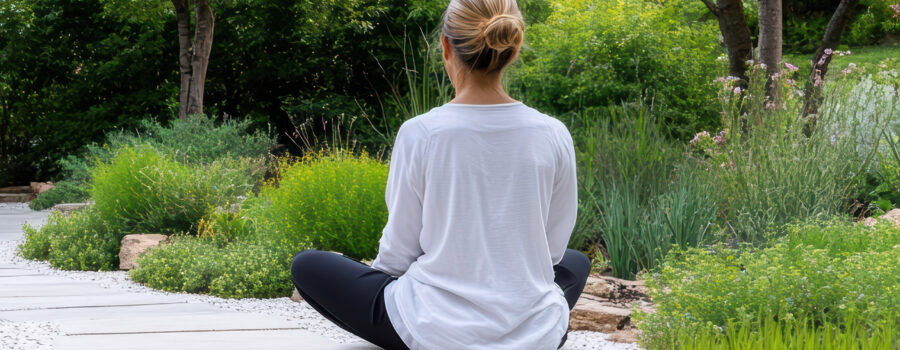In today’s hectic, fast-paced world, many people are seeking ways to reconnect with nature, not just to grow their own food or reduce their carbon footprint, but to find peace of mind and a deeper sense of purpose. May is Mental Health Awareness Month, so I thought it would be interesting to take a look at it from a permaculture perspective. While permaculture is usually associated with sustainable gardening, it can also be a powerful tool for supporting mental health. Whether you’re managing anxiety, looking for an escape from burnout, or seeking a more balanced life, permaculture could be the key to greater mental health.
What Is Permaculture?
Permaculture is a design philosophy that aims to work with nature, not against it. Originating with the idea of “permanent agriculture,” it has evolved to mean “permanent culture.” At its core, permaculture integrates ethics, design principles, and ecological understanding to create self-sustaining systems for food, water, shelter, and community.
The three core ethics of permaculture are Earth Care, People Care, and Fair Share. These ethics, along with twelve design principles, inspire practitioners to live in ways that are both sustainable and emotionally fulfilling.

How I Found Peace in Permaculture
Permaculture is about more than just gardening or growing a food forest. It’s a life philosophy — and a path I started down during COVID. I had been a freelance designer for years, so being homebound was nothing new or concerning. What did affect me during the pandemic was a general sense of doom. What was the origin of the virus? What news sources were credible? Were world governments trustworthy? Were food sources safe? Would the supply chain be reliable?
I no longer wanted to leave that up to someone else. I wanted to be self-reliant. I wanted fresh, healthy, organic food at affordable prices. I had long relied on medicinal herbs and natural remedies, but I no longer wanted to rely on outside sources.
We moved back to Florida in January 2020, right before COVID hit the news. We had downsized substantially, anticipating an empty nest and frequent RV travel. We planned to simplify our lives and enjoy some relaxing time enjoying nature. But things didn’t exactly play out as we had envisioned.
Within a couple of months, my eagerness to travel was replaced with a desire to garden instead. I started buying edible plants, getting my hands in the soil, and spending time in the sunshine began to have a therapeutic effect. Then I discovered permaculture and enrolled in a certification program. My thinking shifted along with my priorities, and I’ve never looked back.

People Care: A Permaculture Core Ethic
People Care means designing systems that nurture human well-being — emotionally, socially, and physically. It recognizes that healthy, resilient communities are essential to the health of the planet. Without care for people, any sustainable or ecological system is incomplete and likely unsustainable in the long term.
The innermost zone in permaculture is the self, and as permaculture practitioners, we embrace the idea that our well-being is connected to our approach to life and everything we do. This interconnectedness creates an awareness of how we care for ourselves as well as others.
Supporting Emotional and Mental Well-Being
Permaculture recognizes that mental health is ecological. Disconnection from nature, community, and meaningful work contributes to anxiety, depression, and burnout. People Care encourages:
- Nature connection (gardening, foraging, animal care)
- Purposeful work and creativity
- Time for rest, reflection, and joy
- Spaces for healing, grieving, and celebration
It values emotional resilience as much as soil resilience.
Building Strong, Inclusive Communities
People Care calls for:
- Collaboration over competition
- Sharing skills, resources, and labor
- Valuing diverse voices and inclusive decision-making
- Conflict resolution and healthy communication
The design of social systems—from neighborhoods to worker co-ops—should foster trust, equity, and mutual support.
The Permaculture–Mental Health Connection
Mental health challenges like depression, anxiety, and burnout are often the result of our modern lifestyles that disconnect us from nature and community. Permaculture directly addresses these root causes by encouraging:
- Mindful interaction with the land
- Cooperative community-building
- Purposeful, values-aligned living

Ways Permaculture Supports Mental Wellness
1. Nature Immersion Reduces Stress and Anxiety
Scientific studies have shown that spending time in nature significantly reduces stress hormones, lowers blood pressure, and improves mood. Permaculture invites daily engagement with natural systems — from observing wildlife to planting perennial polycultures. Forest gardening, food forestry, and wildlife-friendly yards not only enhance biodiversity but also create serene spaces that support mental calm and clarity. The act of grounding—touching soil with your bare hands or feet—has been linked to improved sleep and reduced inflammation, both crucial for mental health.
2. Purposeful Living Rebuilds Self-Worth
One of the greatest mental health challenges is a loss of purpose. In a world driven by consumerism and digital distraction, many feel disconnected from their work and their place in society. Permaculture flips that script. By cultivating your own food, capturing rainwater, or building soil, you become an active participant in creating regenerative systems. Each small action has visible, meaningful results — whether it’s harvesting tomatoes from a guild planting or seeing bees pollinate the herbs you’ve grown. Purpose-driven tasks help rebuild confidence, self-worth, and motivation.

3. Physical Activity Improves Brain Chemistry
Permaculture is inherently physical. Whether you’re sheet mulching, composting, pruning fruit trees, or installing swales, you’re using your body — and that’s a good thing for your brain. Exercise stimulates the production of endorphins, dopamine, and serotonin — all chemicals that support mood stability and resilience. Unlike a gym routine, permaculture chores feel purposeful and rewarding, offering a healthy dose of “green exercise” with tangible benefits.

4. Community Connections Reduce Isolation
Loneliness is a growing public health crisis, especially in urban and digital-first cultures. Permaculture emphasizes community resilience and cooperative effort, often leading to the formation of local permaculture groups, community gardens, and neighborhood food forests.
These shared projects foster connection, trust, and mutual support — key elements for emotional well-being. When people come together to build something sustainable, they not only feed each other but also form bonds that last through tough times. Look for or start a permaculture meetup or skill-share, community composting initiative, or a group garden.
5. Mindfulness Through Observation and Design
One of permaculture’s central practices is to observe and interact. This principle encourages us to slow down, watch, and listen to the land before taking action. It’s a built-in practice of mindfulness, often compared to meditation. By observing plant behavior, seasonal cycles, soil changes, and animal interactions, you naturally enter a more present, attentive mental state. This mindful approach fosters emotional regulation and clarity, especially helpful for those managing anxiety or mood disorders.
6. Seasonal Rhythms Restore Balance
Permaculture teaches us to follow the natural cycles of life: planting in spring, harvesting in summer, preparing for dormancy in fall, and resting in winter. These seasonal rhythms promote mental balance and reduce burnout. Unlike the 24/7 hustle of the modern world, permaculture aligns your work and rest with nature’s patterns. This encourages healthier sleep cycles, work-life boundaries, and more sustainable energy management.

How to Get Started with Permaculture for Mental Health
If you’re new to permaculture and curious about how to integrate it into your wellness journey, here are a few first steps:
- Start Small – Create a container herb garden, compost your kitchen scraps, or plant a few fruit trees.
- Read and Reflect – Blogs like mine, or books like one of my favorites, Gaia’s Garden by Toby Hemenway can inform and inspire.
- Observe Your Space – Take time each day to observe your yard. Take note of sunlight, water flow, and wildlife.
- Connect with Others – Join a local permaculture meetup, permablitz, or take a permaculture design course (PDC).
- Use a Journal – Track your mood and energy levels as you implement new permaculture habits. You might be surprised by the changes.
Final Thoughts: Growing Peace, One Garden at a Time
Permaculture isn’t a quick fix or a trend — it’s a lifestyle rooted in respect, observation, and regeneration. As you deepen your connection to the land, yourself, and your community, you’ll likely discover that your inner landscape begins to heal too.
Mental health is multifaceted, and while therapy, medication, and social support are often essential, integrating permaculture principles into your daily life can offer profound and lasting benefits. Whether you live in a city apartment or a rural homestead, there’s a place for permaculture in your wellness journey.

Copyright © 2025 Fruitful Food Forestry & Lauren Lynch. No portion of the original content on this website may be reproduced, in any language, without express written consent.

Proclaim Your Positivity
With our inspirational products…









Leave a Reply
Your email is safe with us.